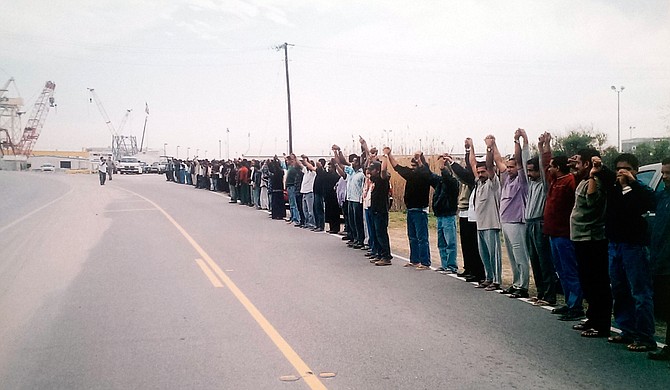In February 2015, a federal jury awarded $14 million in compensatory and punitive damages to five guest workers from India the court determined had been defrauded and exploited. Now, immigrant-rights attorneys say two Mississippi companies hatched a similar plan to exploit guest workers from Mexico. Photo courtesy Bill Chandler
When U.S. Sen. John L. McClellan, an Arkansas Democrat, introduced a sweeping anti-crime bill in 1969, he specifically wanted to bring down what he called "today's power base of organized crime consist(ing) of 24 Costa Nostra groups operating as criminal cartels in the major metropolitan areas of our nation."
The bill, known as the Racketeer Influenced and Corrupt Organizations Act, or RICO, would come to strike fear in the hearts of Mafiosi but, over the years, would also be used against bankers, a Major League Baseball team owner and, most recently, the international soccer governing organization, FIFA.
In 2000, Congress amended the RICO Act so that fraud in foreign labor contracting could trigger a prosecution under the law, a measure aimed at fighting human trafficking. Now, attorneys want to use RICO to prosecute a pair of Mississippi companies they say defrauded workers from Mexico.
"It's not terribly common, but we think it's a fairly sound strategy," said Sarah Rich, a staff attorney with the Southern Poverty Law Center's Immigrant Justice Project.
Last week, the Montgomery, Ala.-based SPLC amended a complaint initially filed in June on behalf of seven men working under the H-2B temporary visa worker program to allege violations of the RICO Act. The lawsuit, filed in federal court in Jackson, alleges that Collins, Miss.-based Culpepper Enterprises Inc. and an Ocean Springs-based employment agency, North American Labor Services Inc., paid "illegally low wages on contracts with the Mississippi Department of Transportation (for) maintaining and performing groundskeeping on right of ways on Mississippi roads and highways."
In order for companies to use foreign temporary workers, the U.S. Department of Labor stipulates that there must be a shortage of American workers who are "able, willing, qualified and available to do the temporary work" and that their employment "will not adversely affect the wages and working conditions of similarly employed U.S. workers."
The telephone number listed for Culpepper Enterprises leads to a voicemail system that does not allow messages to be left; North American Labor Services' listed number goes to a fax machine. The companies have not responded to the SPLC's complaint and have until mid-September to do so.
Rich said workers who contacted the SPLC said they had been promised up to $11 per hour but provided check stubs showing they received the federal minimum wage of $7.25. Meanwhile, the companies raked millions from Mississippi taxpayers.
Both North American Labor Services and Culpepper Enterprises have been administratively dissolved, state records show. The SPLC suit alleges that North American Labor Services continued operating after it dissolved in 2009; Culpepper dissolved in December 2014, according to the Mississippi Secretary of State's website.
The Mississippi Department of Finance and Administration also lists Culpepper as receiving more than $20 million in state contracts, mostly with the Department of Transportation for grass mowing and other roadside landscaping, since 2003. Before 2008, in addition to the MDOT agreements, Culpepper also held landscaping contracts with the Mississippi National Guard.
A federal spending database lists $489,698 worth of assistance to Culpepper between 2007 and 2015. Between 2008 and 2009, the company also held a number of contracts with the U.S. Department of Agriculture through Hurricane Katrina recovery funds.
"We are not privy to information in the suit since we are not involved in it. Culpepper Enterprises did do work for us," said Morgan Miller, a spokeswoman for MDOT's central district. "They were awarded a contract after meeting the criteria based on state laws for a mowing operation. We did not have a contract with North American Labor Services."
The SPLC suit against Culpepper and North American Labor Services also alleges that the workers had to pay a recruiter in Mexico hundreds of dollars as well as pay for their own transportation to Mississippi each year and equipment fees to the companies. The suit asks for unpaid and overtime wages.
"These workers don't have any freedom of choice," Rich said.
The plaintiffs in the case—Ernesto Carillo-Ramirez, Jose Delgado-Palomera, Nestor Delgado-Zamorano, Oscar Pacheco-Santana, Victor Sanchez-Jaimes, Joel Tapia-Ruiz and Adan Esparza-Haro—are currently in Mexico.
Long-Term Effects
Although the Culpepper workers are properly documented, some immigrant-rights activists see parallels between that case and cases involving undocumented workers in recent Mississippi history, including earlier this year.
On May 28, nine workers were called to the offices of American Dairyco LLC in Edwards, where they were arrested by agents with Attorney General Jim Hood's office and the U.S. Immigration and Customs Enforcement.
"It's a different situation, but the motivations are the same," said Bill Chandler, executive director of the Mississippi Immigrant Rights Alliance, of the lawsuit against Culpepper and North American Labor Services.
The men, from Mexico and Central America, ranged in age from 20 to 40 and were charged with identity theft for allegedly purchasing fraudulent documentation to bypass the E-Verify system. In a way, the arrest demonstrated the effectiveness of the system, which the Legislature passed in 2008 to put most of the responsibility for making sure workers, including immigrants, are legally authorized to work in the U.S.
Four weeks before the arrests, after an I-9 audit by the IRS, one employee was found guilty of possessing fraudulent identification. ICE stepped in to arrest the undocumented worker, and in turn, the audit became an opportunity for Hood's Consumer Protection Division, part of the Homeland Security Task Force offices, to conduct a E-Verify audit of all American Dairyco employees.
In a press release, Hood said Boulder, Colo.-based American Dairyco fully cooperated with the investigation and would not face penalties.
Meanwhile, the costs for the immigrant workers who often go into debt to travel to this country, legally and illegally, to help their families are high and that the punishment for breaking the rules is still unevenly doled out against workers and their families back home, Chandler said.
"What happens is that corporations are looking for vulnerable workers, employers are looking for vulnerable workers, and more often than not, they find undocumented workers who, because of their lack of status, agree to work at lower wages," he said.
In 2008, more than 600 immigrants were arrested at Laurel-based Howard Industries in the largest workplace raid in U.S. history, which resulted in most immigrants being deported. For its role, U.S. District Judge Keith Starrett ordered Howard Industries to pay $2.5 million in fines for conspiracy to violate immigration laws in 2011. Although the fine against the company was hefty, at the minimum wage rate of $7.25, their deportations represented approximately $9 million in lost yearly wages for the workers and their families.
In the case of the American Dairyco raid, the nine defendants each face up to $10,000 in fines and two to 15 years in prison if found guilty of identity theft. One week after their initial hearing, Hinds County Circuit Judge Melvin Priester Sr. denied the men's requests for bond and remanded the case to a grand jury. A hearing is scheduled for the morning of Friday, Sept. 11.
Chandler points to various laws that protect employers who unknowingly hire undocumented workers, including the federal 1986 Immigration Reform and Control Act. Yet, these laws leave workers susceptible to fines, jail time and deportation; in 2014 alone, some 315,000 undocumented workers were arrested and deported, information from the U.S. Immigration and Customs Enforcement shows.
As a result, hundreds of thousands of families are left with little or no income, as many of these workers enter the U.S. with family or intentions to send money back over the border, Chandler said.
In addition, employers encourage undocumented workers to seek out options to bypass the state mandated E-Verify system, in which employers confirm Social Security information the employee supplies, he said. The E-Verify system provides immunity for employers who hire workers without valid documentation, shifting the blame to faulty Social Security numbers and a system that shows a false-positive 5 percent to 7 percent of the time.
A Rare Victory
Attorneys for the SPLC and activists in Mississippi see a glimmer of hope for success in the case in a settlement from February. A federal jury in New Orleans awarded $14 million in compensatory and punitive damages to five guest workers from India the court determined had been defrauded and exploited in a labor trafficking scheme engineered by Mobile, Ala.-based Signal International.
The suit, which the SPLC brought on behalf of the workers at Signal's Pascagoula facility, determined that in the aftermath of Hurricane Katrina, Signal used the U.S. government's H-2B guest worker program to import nearly 500 men from India to work as welders, pipefitters and to repair hurricane-damaged oil rigs and other facilities. The workers had each paid a recruiter in India between $10,000 and $20,000 to get on the list.
A month-long trial resulted in a jury verdict that found that Signal and its agents had engaged in labor trafficking, fraud, racketeering, discrimination, false imprisonment and retaliation. It was a rare victory, Chandler said.
"Thousands over the years, really, millions of workers have been arrested and deported, but only a handful of employers have been sanctioned," Chandler said.
Many advocates want to see the guest worker program abolished. In 2009, a series of immigration reforms, including to the guest worker program, Democratic U.S. Rep. Sheila Jackson-Lee authored died in a House subcommittee.
A 2013 SPLC report on guest workers titled "Close to Slavery" concluded: "We are a nation of immigrants, not a nation of temporary workers. Temporary workers who come to the United States make a valuable contribution to our nation. They should be incorporated into our society as full members so that they too are entitled to the same benefits, rights, and protections enjoyed by all workers in the United States. The time has come for Congress to abolish—not expand—our shamefully abusive guestworker system."
In March 2015, the guest worker program was suspended after a federal judge in Florida ruled that the Labor Department lacks the legal authority to regulate; it was reinstated two weeks later.




Comments
Use the comment form below to begin a discussion about this content.
comments powered by Disqus